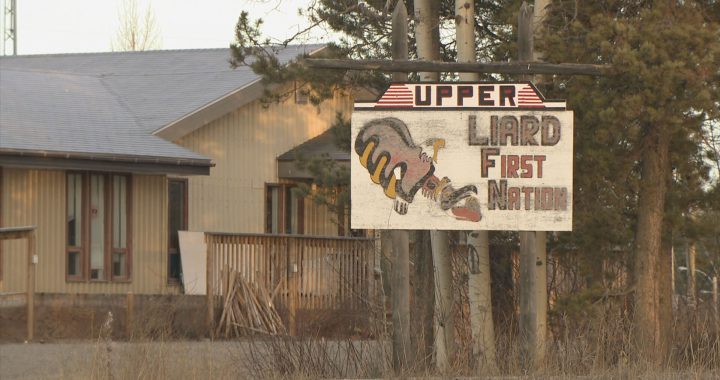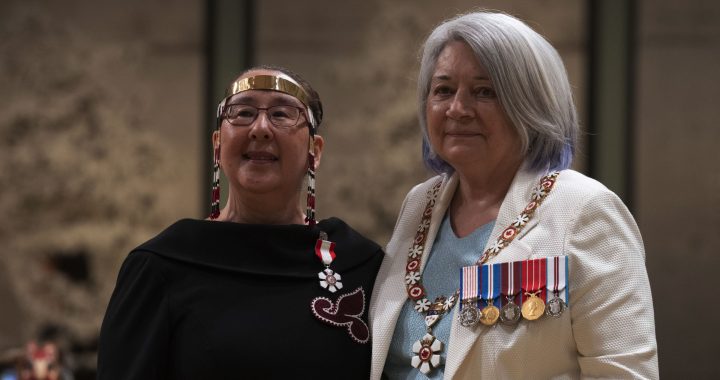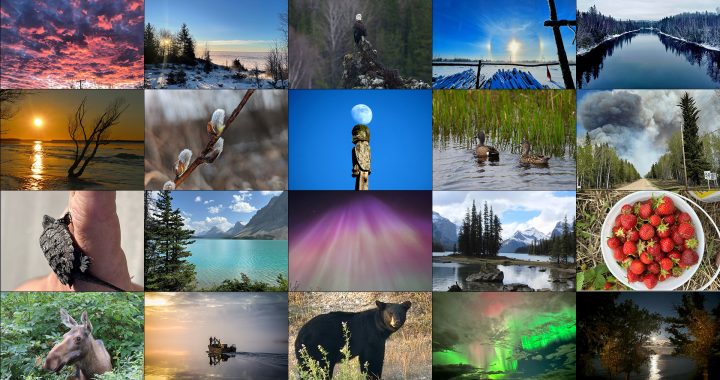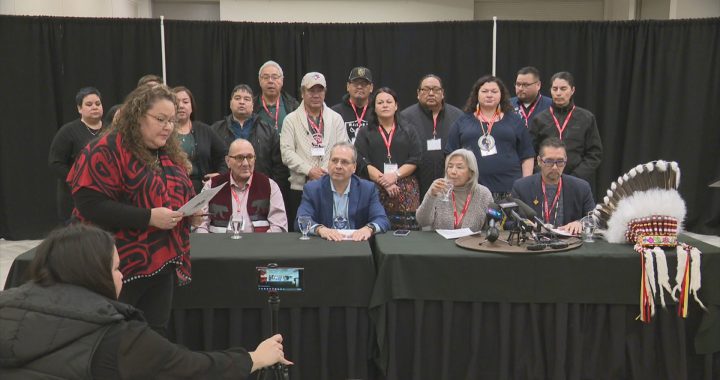(Mi’kmaw hunter Storm Alexander turns as a helicopter draws near to pick up a moose killed during a harvest in the Cape Breton Highlands National Park. Photo courtesy Unama’ki Institute of Natural Resources)
Trina Roache
APTN National News
Organizers of a Mi’kmaw moose harvest in a national park in Nova Scotia are calling it a success despite a protest that caused delays last month.
According to organizer Clifford Paul, 37 moose were harvested from the Cape Breton Highlands National Park.
“It was a very humbling experience,” said Paul. “All the eyes of the Mi’kmaq Nation were upon us.”
Paul, moose management coordinator for the Unama’ki Institute of Natural Resources (UINR) called the Mi’kmaq-led harvest historic because it was the first one carried out in a national park in the province.
Biologists believe that if the moose population was allowed to grow, the boreal forest would eventually be destroyed.
But all the attention came on the heels of opposition by local non-Mi’kmaq who live near the Cape Breton highlands National Park.
The harvest was suspended after 30 people marched into the park and confronted the Mi’kmaq.
There were tense moments as tempers flared.
The protesters carried conflicting messages.
On the one hand, they cited concerns over a dwindling moose population.
One the other, they wanted in on the hunt.
But those rights belong to the Mi’kmaq, said Paul. Their aboriginal and treaty rights are why they were the ones to do it.
Though the protesters managed to suspend the harvest that day. Paul said in the end, all the media attention was a good thing for the Mi’kmaq.
“What come out of it was that people took a closer look at the Mi’kmaq,” said Paul. “How the Mi’kmaq share the meat. Everything was distributed. That sets an example for a lot of harvesters elsewhere. These harvesters unselfishly did the work as volunteers to put food on the table for both Mi’kmaq and non-Mi’kmaq alike. Despite all the criticism thrown at us, the Mi’kmaq are all about caring and sharing.”
The moose harvest wrapped up earlier this week.
“Some of the moose meat was donated to the charity Feed Nova Scotia, to the Mi’kmaw Legal Services Network, as well as local families in need. The rest of the meat has been shared by Mi’kmaq communities around Nova Scotia,” said Paul.
Concerns among protesters over a fragile moose population didn’t pan out.

The 37 moose were harvested in a 20 square kilometre area. That represents about 2 per cent of the park, which is home to around 1800 moose.
“The harvesters said they found a lot of old moose trails, super highways where moose go through, there’s a lot of damage caused by over browsing,” said Paul.
In addition to the Mi’kmaq observations, scientists have studied the area for 15 years and have called the overabundant moose population “unsustainable.”
“We talk so much about moose, but really the goal is in forest restoration and forest health,” said Derek Quann, a resource conservation officer with Parks Canada. “One third of the boreal forest in the Cape Breton Highlands National Park is severely degraded. About 11 per cent has transformed to grassland.”
For the Mi’kmaq, the harvest was always about more than the moose.
“It was a lot of responsibility,” said Paul. “This is a part of not only our treaty right, but the responsibility that goes along with that treaty right. So the moose can thrive in the future in numbers that are conducive to sustainability.”
The question of charges against the protesters for illegally entering a restricted zone is still up in the air.
UINR board member Chief Rod Googoo said, “We have asked Parks Canada to determine if charges will be made and leave it to their discretion.”
No word from Parks Canada yet, other than that they are looking into it.










